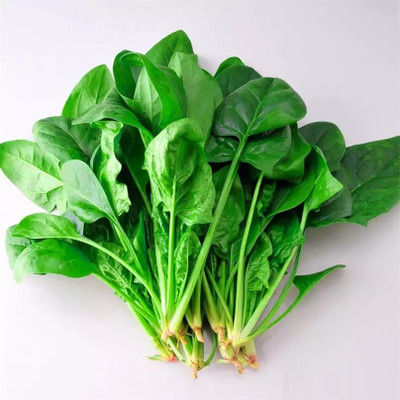MYLAWN Organic Chinese Green Spinach Seed(500 per packet)
Quick Overview
Product Price Comparison
Product DetailsThis famous leafy vegetable in Indian cuisine has small, crisp leaves and thrives in cooler or semi-shaded conditions. Its distinct flavour is already recognizable to most of us, and it appears to be improved significantly when grown in a home garden. Depending on how you plan to eat it, palak spinach leaves can be harvested at three stages: infant, normal, and big. When harvests and conditions are well handled, they can produce for months. In warmer weather, it can grow slowly and flourish when it's colder. When used as a natural dye, the leaves of the palak spinach produce shades of green.Benefits/Uses of Palak spinachCulinary Use:Palak spinach can be eaten raw in cold or warm salads or cooked in soups or pasta sauces.It is very common in egg dishes like omelettes or quichesCooking methods include boiling, microwave cooking, steaming, and stir-frying.Specifications of palak spinachCommon NamePalak spinachSunlightFull SunWaterWater RegularlyTemperature70 ┬░FSoilwell-drained soil Or Loamy SoilFertilizerApply any organic fertilizerGermination10┬░C - 22┬░CHarvest SeasonExcept for Dec - FebPlanting and care for Palak spinachSowing Palak spinach seedsMake sure the place where you want to plant the seeds has a good mix of light and shadow.Additionally, ensure that the soil is well-drained and has a pH of 6.5 to 7.Additional nutrients in the form of compost or manure may also be added to the soil to enrich it.Prepare the soil at least one week before the seeds are planted with old manure.It is suggested that the seeds be planted half an inch deep in the soil in grow bags, with at least 3ŌĆØ ŌĆō 4ŌĆØ between each seed. The plants would be able to flourish and extend their roots as a result of this.Ensure the soil is moist during germination to improve the process.Growing Palak spinachBear in mind your plants' growth. If the seedlings exceed 2" height, trim the plants to around 2"-3."Always keep an eye on how much water you're giving your plants. You must keep the soil moist at all times. Don't drown them in water. Watering early in the morning allows the plants to absorb the water during the day.Alternatively, you can allow your palak spinach plants to flower, allowing you to enjoy the lovely spring blooms while also collecting seeds for the following season. Harvesting Palak spinachIf properly cared for, Palak spinach should be ready for harvest in about 60 days 45-50 days.The majority of spinach varieties are sufficiently mature to harvest within 45 days. It can, however, take up to 60 days in some cases.You can say that your crop is ready for harvest as soon as 5-6 leaves have been formed on every plant. At this point, don't wait.Harvest your crop within a week of the plants reaching maturity.There are several ways that these leafy greens can be harvested. In any plant's growth process, fertilization is extremely important. This ensures a good return by the season of harvest.One way is to start from the outside and cut into the centre of the plant with a pair of scissors. Usually, this method is preferred if you only need a small number of leaves.Another way would be to cut the whole plant from the root and leave a centimetre from the roots, with a pair of scissors. The plants will reproduce and you will enjoy more palak spinach.In any case, wait not too long for the crop to be harvested, as the leaves can turn bitter once it has matured. You should always use fresh leaves. But Palak spinach will continue to be fresh in the refrigerator for 10-14 days at a temperature between 5┬░C and 10┬░C if you want to store it for later use. However, make sure you completely wash the leaves and remove any yellow leaves from the lot before it is stored.Precautions while growing Palak spinachPalak spinach seeds not germinating ŌĆō If your seeds do not germinate, it is because they were either too wet or too warm, or they were too old and no longer viable. For best results, always plant fresh palak spinach seeds in well-draining, cool soil.Seedlings arenŌĆÖt growing ŌĆō It's possible that your seedlings aren't growing because it's too shady, the soil is too wet or dry, or the weather is too hot for them. Maintain an even moisture level in the soil and experiment with feeding to see if it stimulates new growth. If not, adjust your planting schedule next time.Palak spinach seedlings bolting ŌĆō Bolting is another common problem with Palak spinach plants, in addition to pests and diseases. Your palak spinach plants are bolting if they are going to seed. In the final stages of the growth process, this may be caused by a lack of water, too much light, or too much heat. To prevent bolting, remove the plants as soon as possible; otherwise, the leaves would become bitter and inedible.


